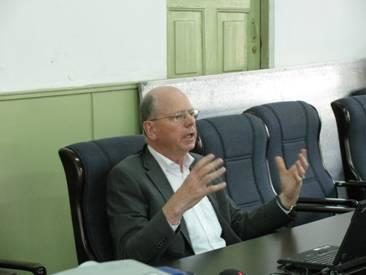
Prof. Paul U. Unschuld, the famous historian of Chinese Traditional Medicine of German, gave a lecture in institute for the history of natural science, Chinese Academy of Science on 11 September, 2009.This lecture, which named The history of the German encounter with Chinese medicine from its beginnings in the 17th century to the present , attracted a lot of scholars and students from Beijing University of Chinese Medicine and Chinese Academy of Chinese Medical Sciences.
In the late 17th century, Andreas Cleyer, a German physician in the service of the Dutch East India Company published, in Latin language, a book on Chinese medicine. Ever since, knowledge on the Chinese tradition of interpreting and dealing with health and disease has been presented by authors with various backgrounds to the German public. Stimulated by French colleagues, a German Physicians Association for Acupuncture was founded in the early 1950s. However, it was only in the 1970s, following the opening of China , that the German public became familiarized with so-called TCM and acupuncture on a grand scale. In the meantime, countless German and Chinese practitioners with varying backgrounds of training an expertise have set up privately owned clinics and work in hospitals all over the country. Attempts at explaining the effects of acupuncture by modern scientific methods have been undertaken by some research institutes. Still, TCM and acupuncture have remained marginal in the German health care delivery system, and will, most likely, not be able to have a stronger impact despite strong lobbying efforts supported by the Chinese government. This lecture traced the historical phases of the German encounter with Chinese medicine, and it offered some interpretations of, first, why TCM and acupuncture have been welcomed in recent decades by some parts of the German public, and, second, why TCM and acupuncture will remain of little influence on general health care in future.
Related News
- Professor Chen Naixing served as an honorary member of the International Advisory Board in the Gas Turbine Society of Japan (GTSJ)
- First Prototype of a Super Conducting Dipole Magnet for the Super-FRS at FAIR
- The 12th Workshop on Beam Cooling and Related Topics Held in Lanzhou
- The 3rd workshop on Soil Microbial Ecology in ISA
Photos
More>>trade
- Boeing and QIBEBT to Launch Collaboration on Bio Jet Fuel R&D
- 21st International Conference on Magnet Technology Held at Hefei
- Professor from Ohio State University Visits Institute of Hydrobiology
- International Workshop of Urban Geography held in Beijing
- Netherlands Organization for Science Research (NOW) Delegation Visits Guangzhou
market
- Second CSNS ATAC Review Meeting Held at IHEP
- CAS Vice President DING Zhongli Visits Laos and ISL's Lao Based Project
- NEDO Delegation of Japan visit IEE, CAS
- Prof. QIU Huasheng and Prof. CHEN Jin Head Delegation to Cambodia
- Four German Doctoral Students Work at CAS/CTGPC Xiangxi River Ecological Station
finance
- FAIR Scientific Director Prof. Boris Sharkov Visits IMP
- Second Japan-China Symposium on Measures against Sediment Disasters Caused by
- ISL Expands Technological Shares in China-Laos Minerals Development and
- Academic Lectures on Application of Isotopes in Ecological studies Held in
- IMHE Experts Rush to Pakistan for Emergency Risk-elimination Construction of





